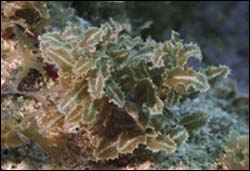The majority of tiny marine plants weathered the abrupt climate changes that occurred in Earth’s past and bounced back, according to a Penn State geoscientist.
“Populations of plankton are pretty resilient,” says Dr. Timothy J. Bralower, head and professor of geoscience.
Bralower looked at cores of marine sediments related to thousands of years of deposition, to locate populations of these plankton during three periods of abrupt climate change. These abrupt changes wer
Humans are performing a high-stakes climate experiment by burning fossil fuels that release heat-trapping greenhouse gases into the atmosphere. The outcome of that experiment is uncertain and computer models can do only so much to predict the future.
So scientists have been paying increasing attention to the geologic past, searching for possible lessons from ancient episodes of warming driven by natural processes which also might include emission of greenhouse gases. The research, discussed in
Large amounts of a chemical that boosts ozone production are being transported to North America from across the Pacific Ocean in May, according to a new report by researchers from Georgia Tech. These higher levels of nitrogen oxides (NOx), arriving in late spring, could be contributing to significant increases in ozone levels over North America. The research appeared in volume 33 of the journal Geophysical Research Letters.
“It’s well-known that pollutants don’t always stay in
German and British scientists have studied the ocean off south-western Africa and have discovered that particles are transported to the deep ocean over thousands of years before being deposited on the seabed. This discovery may increase our understanding of how the oceans act as carbon dioxide sinks and how oil deposits form.
Areas of extremely high marine productivity are confined to small sections of modern continental margins. Despite their limited size, these areas are co
Water. Waste. Energy. This trio of problems is among the greatest challenges to the environmental health of society. Water purification alone is becoming more problematic in the world due to our increasingly reliance on contaminated sources, such as polluted rivers, lakes and groundwater.
“All of these issues are closely interrelated,” says Bruce Rittmann, director of the Center for Environmental Biotechnology in the Biodesign Institute at ASU. “For example, most of the pollutio

New species of fish, seaweeds found on Caribbean’s Saba Bank
An underwater mountain that forms the world’s third-largest atoll has some of the richest diversity of marine life ever found in the Caribbean, according to scientists who recently explored the area.
The two-week expedition in January encountered new species of fish, seaweed and other ocean life at little-studied Saba Bank Atoll, a coral-crowned seamount 250 kilometers southeast of Puerto Rico in the Dutch Wind